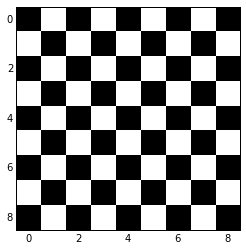3.3 Scikit-image:图像处理
最后更新于:2022-04-01 11:22:01
# 3.3 Scikit-image:图像处理
> **作者**: Emmanuelle Gouillart
[scikit-image](http://scikit-image.org/)是专注于图像处理的Python包,并且使用原生的Numpy数组作为图像对象。本章描述如何在不同图像处理任务上使用`scikit-image`,并且保留了其他科学Python模块比如Numpy和Scipy的链接。
**也可以看一下:**对于基本图像处理,比如图像剪切或者简单过滤,大量简单操作可以用Numpy和SciPy来实现。看一下[使用Numpy和Scipy图像操作和处理部分](http://www.scipy-lectures.org/advanced/image_processing/index.html#basic-image)。
注意,在阅读本章之前你应该熟悉前面章节的内容,比如基础操作,比如面具和标签作为先决条件。
**章节内容**
* **介绍和观点**
* `scikit-image` 和 `SciPy`生态系统
* `scikit-image`能发现什么
* **输入/输出, 数据类型和 颜色空间**
* 数据类型
* 颜色空间
* **图像预处理/增强**
* 本地过滤器
* 非-本地过滤器
* 数学形态学
* **图像细分**
* 二元细分: 前景 + 背景
* 基于标记的方法
* **测量区域的属性**
* **数据可视化和交互**
## 3.3.1 介绍和观点
图像是NumPy的数组`np.ndarray`
| 图像: | np.ndarray |
| --- | --- |
| 像素: | array values: a[2, 3] |
| 渠道: | array dimensions |
| 图像编码: | dtype (np.uint8, np.uint16, np.float) |
| 过滤器: | functions (numpy, skimage, scipy) |
In [1]:
```
%matplotlib inline
import numpy as np
check = np.zeros((9, 9))
check[::2, 1::2] = 1
check[1::2, ::2] = 1
import matplotlib.pyplot as plt
plt.imshow(check, cmap='gray', interpolation='nearest')
```
Out[1]:
```
<matplotlib.image.AxesImage at 0x105717610>
```

### 3.3.1.1 scikit-image 和 SciPy 生态系统
最新版的`scikit-image`包含在大多数的科学Python发行版中,比如,Anaconda或Enthought Canopy。它也包含在 Ubuntu/Debian。
In [6]:
```
import skimage
from skimage import data # 大多数函数在子包中
```
大多数`scikit-image`函数用NumPy ndarrays作为参数
In [6]:
```
camera = data.camera()
camera.dtype
```
Out[6]:
```
dtype('uint8')
```
In [7]:
```
camera.shape
```
Out[7]:
```
(512, 512)
```
In [8]:
```
from skimage import restoration
filtered_camera = restoration.denoise_bilateral(camera)
type(filtered_camera)
```
Out[8]:
```
numpy.ndarray
```
其他Python包也可以用于图像处理,并且使用Numpy数组:
* [scipy.ndimage](http://docs.scipy.org/doc/scipy/reference/ndimage.html#module-scipy.ndimage) : 对于 nd-arrays。基础过滤、数学形态学和区域属性
* [Mahotas](http://luispedro.org/software/mahotas) 同时,强大的图形处理库有Python封装:
* [OpenCV](https://opencv-python-tutroals.readthedocs.org/en/latest/) (计算机视觉)
* [ITK](http://www.itk.org/itkindex.html) (3D图像和注册)
* 其他 (但是,他们没有那么Pythonic也没有Numpy友好,在一定范围)。
### 3.3.1.2 scikit-image能发现什么
* 网站: [http://scikit-image.org/](http://scikit-image.org/)
* 例子库 (就像在 [matplotlib](http://matplotlib.org/gallery.html) 或 [scikit-learn](http://scikit-learn.org/)): [http://scikit-image.org/docs/stable/auto_examples/](http://scikit-image.org/docs/stable/auto_examples/) 不同类的函数,从基本的使用函数到高级最新算法。
* 过滤器: 函数将图像转化为其他图像。
* NumPy组件
* 通用过滤器算法
* 数据简化函数: 计算图像直方图、局部极值位置、角。
* 其他动作: I/O, 可视化,等。
## 3.3.2 输入/输出, 数据类型和颜色空间
I/O: [skimage.io](http://scikit-image.org/docs/stable/api/skimage.io.html#module-skimage.io)
In [4]:
```
from skimage import io
```
读取文件: [skimage.io.imread()](http://scikit-image.org/docs/stable/api/skimage.io.html#skimage.io.imread)
In [7]:
```
import os
filename = os.path.join(skimage.data_dir, 'camera.png')
camera = io.imread(filename)
```

支持所有被Python Imaging Library(或者`imread` `plugin`关键词提供的任何I/O插件)的数据格式。 也支持URL图片路径:
In [3]:
```
logo = io.imread('http://scikit-image.org/_static/img/logo.png')
```
存储文件:
In [4]:
```
io.imsave('local_logo.png', logo)
```
(`imsave`也用外部插件比如PIL)
### 3.3.2.1 数据类型

图像ndarrays可以用整数(有符号或无符号)或浮点来代表。
小心整数类型的溢出
In [8]:
```
camera = data.camera()
camera.dtype
```
Out[8]:
```
dtype('uint8')
```
In [8]:
```
camera_multiply = 3 * camera
```
可用不同的整型大小: 8-, 16- 或 32-字节, 有符号或无符号。
一个重要的 (如果有疑问的话) `skimage` **惯例**: 图像浮点支持在[-1, 1] (与所以浮点图像相对)
In [9]:
```
from skimage import img_as_float
camera_float = img_as_float(camera)
camera.max(), camera_float.max()
```
Out[9]:
```
(255, 1.0)
```
一些图像处理程序需要应用在浮点数组上,因此,输出的数组可能类型和数据范围都与输入数组不同
In [9]:
```
try:
from skimage import filters
except ImportError:
from skimage import filter as filters
camera_sobel = filters.sobel(camera)
camera_sobel.max()
```
Out[9]:
```
0.5915023652179584
```
在上面的例子中,我们使用`scikit-image`的子模块`filters`,在0.11到0.10版本间,`filter`被重命名为`filters`,为了避免与Python内置的`filter`冲突。
在[skimage](http://scikit-image.org/docs/stable/api/skimage.html#module-skimage)提供了下列skimage实用的函数来转化dtype和data range: `util.img_as_float`、 `util.img_as_ubyte`等。
看一下[用户手册](http://scikit-image.org/docs/stable/user_guide/data_types.html)来了解细节。
In [ ]:
```
An important (if questionable) skimage convention: float images are supposed to lie in [-1, 1] (in order to have comparable contrast for all float images)
```
In [ ]:
```
3.3.1. Introduction and concepts
Images are NumPy’s arrays np.ndarray
```